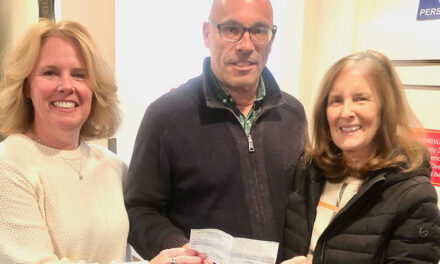Published June 4, 2020 By MAUREEN DOHERTY
By MAUREEN DOHERTY
NORTH READING — “The ultimate weakness of violence is that it is a descending spiral begetting the very thing it seeks to destroy; instead of diminishing evil, it multiplies it. Through violence you may murder the liar, but you cannot murder the lie, nor establish the truth. Through violence you may murder the hater, but you do not murder hate… Returning violence for violence multiplies violence, adding deeper darkness to a night already devoid of stars. Darkness cannot drive out darkness; only light can do that. Hate cannot drive out hate; only love can do that.”
~ Dr. Martin Luther King Jr.
More than half a century ago, as the leader of our nation’s peaceful civil rights movement who was on a quest for equality for all races, Dr. Martin Luther King Jr. wrote these words in what would be his last book, “Where Do We Go From Here: Chaos or Community?” just months before his assassination on April 4, 1968.
Today, despite our society’s vast gains, inequities persist in our communities, the struggles continue, and the chaos has spilled onto the streets in the wake of the May 25 homicide of George Floyd, 46, an African American man, at the hands of four white police officers in Minneapolis, Minn.
Floyd’s death has been ruled a homicide by both the Hennepin County Medical Examiner’s office in Minneapolis and the private autopsy sought by Floyd’s family.
The Hennepin medical examiner’s report stated that Floyd “experienced a cardiopulmonary arrest while being restrained by law enforcement officer(s).”
The four officers involved in the case were fired immediately. The ME’s report also noted “other significant conditions” contributing to Floyd’s death were “Arteriosclerotic and hypertensive heart disease; fentanyl intoxication; recent methamphetamine use.”
Floyd’s “crime?” A deli worker had called 9-1-1 after Floyd allegedly tried to pass a $20 counterfeit bill on the Memorial Day holiday.
Why does this matter in North Reading, Mass.? Because it affects us all. We’ve heard the hackneyed expression “we’ll get through this together” so often during nearly three months of a nationwide shutdown to deal with the COVID-19 pandemic that it rings hollow. In a matter of days, a virus has brought our economy to a near standstill, transforming one of the lowest unemployment rates in our history to one in which 40 million people have lost their jobs, including more than one million in our home state. This health crisis and the subsequent unemployment crisis has disproportionately affected communities of color everywhere, magnifying these inequalities.
Though we’ve made many gains in our understanding of this virus a mere weeks after it began ravaging our society, if our current situation still feels untenable, then how untenable must it be to be a person of color in America who, despite all of our country’s gains, continues to feel marginalized and silenced 52 years after King’s assassination and who continues to be told: “Wait just a little longer; it will get better, we just don’t know when?”
After video went viral of Floyd being restrained by those now former police officers, specifically that of one officer’s knee on his neck for nearly nine minutes on Memorial Day while Floyd could be heard pleading that he could not breathe, and another officer could be seen standing by doing nothing, protests have broken out nationwide, including in Boston. These demonstrations have ranged from peaceful vigils and civil disobedience to outright violence and riots. At least five more individuals have been killed during these protests and millions of dollars worth of property has gone up in flames or been looted.
Already on the mat after the one-two sucker punch caused by the COVID-19 pandemic, palpable anger has boiled over into the streets. Those small business owners barely able to hang on to what they’ve worked a lifetime to achieve due to this pandemic have been knocked down again by these riots. In addition to the innocent bystanders getting hurt while attempting to protect their own stores and properties, multitudes of police officers who would never have acted in the criminal way those four had behaved while arresting Floyd in Minneapolis have also been targeted while trying to keep the peace.
Select Board speaks out
This nationwide violence has touched us here locally, and at the outset of Monday night’s virtual Select Board meeting, Chairwoman Kate Manupelli addressed this crisis and opened up the floor to her fellow board members, two of whom have children in law enforcement who were protecting the public in Boston during Sunday’s protests, Liane Gonzalez and Stephen O’Leary.
Select Board member Andrew Schultz also pointed out that at least two members of the North Reading Police Department, who also serve on NEMLAC (North Eastern Massachusetts Law Enforcement Council), were also called into Boston to keep the peace. NEMLAC pools the resources of police departments in both Middlesex and Essex counties when a regional response is needed.
“Given the state of the traumatic events that we’ve witnessed, not only murder of someone in custody under someone’s knee but also the violence we’ve seen unfolding before our eyes resulted in some additional acts of brutality that only some of these individuals are causing…it’s important for us to bring this up,” Manupelli said, while referencing “a murder of a contracted Secret Service officer and six other individuals caught in the violence protesting what is going on.”
“I think the violence is detracting from the message of change that the protesters are trying to impart on us and really takes away from the civil rights movement to change systemic racism that we as Americans should all stand with in solidarity,” Manupelli said.
“This is not a ‘partisan issue,’” Manupelli said, recalling on Monday a conversation she had with her daughter in which she summed it by stating: ‘This is not a Republican issue, this is not a Democrat issue, it is about all of us against racism period.’”
When witnessing these “traumatic events if it didn’t evoke an emotional response you are probably not human,” Manupelli said. She added that while watching the events unfold on television Sunday night she could not help but wonder “if one of the young kids I was watching in his or her protective gear was the son or daughter of my colleagues…defending protesters and trying to carry that civil rights message forward for us.”
Manupelli ended her statement by reading a universal prayer for peace.
“Amen to everything you just said,” O’Leary said. “My son is on the front line. He was there last night and we were communicating up until 3:30 a.m. with him. He is forced into double shifts, mandatory, and yesterday morning we had a conversation about what had occurred and he said ‘what happened to Mr. Floyd was criminal.’”
O’Leary said he was “heartened” by comments made by the chief of police of Minneapolis on a CNN report that “all four officers were culpable. Silence is culpability.”
“That echoed in my mind that we can’t be silent. I was heartened by what I saw from 3 p.m. to 9 p.m. in the city of Boston. It was peaceful… there were no public speakers but the people who were being interviewed were thoughtful, considerate, on target and looking to address this situation locally and nationally,” recalled O’Leary.
But the tenor of the night changed while he and his wife watched events unfold in that same city from 11 p.m. to 1 a.m.
“It was unbelievable what we saw unfolding before our eyes knowing that our son was right there on Boylston Street. It was somewhat disconcerting,” he admitted. He thanked Manupelli for giving them time to speak on the matter because “it should start locally with the leadership here and go up,” O’Leary said adding that mayors and governors are not “being weak” when they make attempts to listen to the message of the protesters.
“It’s the few that are causing the violence, the riots and the looting…This is not going to go away quickly. There is another march tomorrow night. We need to have restraint,” O’Leary said.
Select Board member Rich Wallner said it was “amazing that this issue is resonating so universally when you think about all the cities and neighborhoods that have gotten behind this.” Although Wallner said he was “vastly disappointed” to see the violence perpetrated by a few on Sunday night, he recalled a comment made by Congressman Seth Moulton a few years ago that ‘the reality in America is your zip code defines your future,’ and that is the systemic racism that we have in our country — you are defined by the zip code in which you are born. When you start talking that way you are talking no hope, and when you are talking no hope people are going to act out because no one is listening.”
“It is just abhorrent. You watch this video and what happened to Mr. Floyd, and normally, I wait for the facts but there are no facts that can justify this video,” Select Board member Andrew Schultz said, adding “… this can’t happen in America.”
Schultz agreed with O’Leary, commenting that “we cannot conflate the protesters with the rioters, they are two different groups of people. The protesters are protesting and they should protest because it is horrible… The rioters are rioters; they need to be dealt with separately. They are not the protesters and I think when people try to conflate the two it loses its message.”
Schultz added, “I don’t think the country is systematically racist. We elected an African American president to two terms. I think there are elements of the country that are racist and that’s what needs to be rooted out.”
“It is not a ‘them’ or an ‘us.’ What happened to George Floyd is just wrong; that can’t happen in America. It is a criminal act to be dealt with sharply. The whole thing saddens me. This country can be very tribal, but I think there is only one side to this issue, and that is the right side,” Schultz said. “I hope we become a better country after this because right now things are not good out there.”
Select Board member Liane Gonzalez said her daughter, a state trooper, was there on the front lines Sunday night.
“She came home for a couple hours and had her riot gear on and went back out the door. To say that I am nauseous and sick and terrified would be an understatement,” she said.
“I have some different feelings. I find I was not impressed with our leadership in this state or this city. I don’t believe during a pandemic when we have every event of the summer canceled that thousands of people were allowed to come, shoulder to shoulder, for hours together. I thought we were in a pandemic. Did (the virus) take the day off? But the fact that that was encouraged I thought that was wrong,” Gonzalez said, although she was glad the original protests had been peaceful.
“I don’t know anybody who does not think what happened to George Floyd was criminal … so I don’t see where we should have opened up the city to these thousands of people and spread the virus around again,” she said.
“And I was also disappointed that both (Boston) mayor and our governor told our law enforcement officers not to wear their protective head gear because it would look ‘intimidating’ to the protesters. That is a very bad disadvantage and to watch my daughter at the State House with these thousands of people who could have gone over that gate and she had no protection,” Gonzalez said.
“So let’s hope we protect our law enforcement better than that, and going forward, not worry about intimidating people. Obviously, they were going to riot anyway — not the peaceful ones. That was a beautiful day and it worked out fine,” Gonzalez said even though she thought it should not have been allowed to be held due to the virus.
However, in light of the riots that broke out after dark in other cities throughout the country, Gonzalez said as the sun was going down on Sunday she knew it was going to happen here too. “Let’s hope that we can learn from that… and think about our law enforcement and pray for them, and hope that they are protected because I don’t think this is over,” she said.
Manupelli thanked all the members for their comments. “I think it is important for us to keep the dialogue moving, to keep progressing, and to keep the message of civil rights moving forward. It needs to be heard,” Manupelli said. “Change needs to happen in a peaceful, positive way.”




